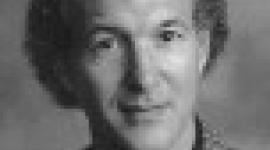Anxiety Disorder Relapses

![]()
Evelyn Goodman Psy.D., MFT, our guest speaker, is an anxiety disorder treatment specialist. She has worked with several anxiety treatment programs. The discussion centers around what to do when you experience an anxiety disorder relapse.
David Roberts: HealthyPlace.com moderator
The people in blue are audience members.
David: Good evening everyone. I'm David Roberts. I'm the moderator for tonight's conference. I want to welcome everyone to HealthyPlace.com.
Before we start, I would like to invite everyone to visit our Anxiety Community home page and sign up for the mail list on the side of the page, so you can keep up with events like this.
Our topic tonight is "Anxiety Disorder Relapses". Our guest is Evelyn Goodman, Ph.D. Dr. Goodman is in private practice in Los Angeles, California and specializes in treating anxiety disorders and panic attacks. She has worked with several anxiety treatment programs. Dr. Goodman has presented workshops on anxiety treatment at conferences given by the Anxiety Disorders Association of America.
Good Evening, Dr. Goodman, and welcome to HealthyPlace.com. We appreciate you being our guest tonight. So that everyone knows what we're talking about, can you please define a "relapse" for us?
Dr. Goodman: A relapse is another word for a setback. It happens when people work to recover from their anxiety disorders - 2 steps forward and one back.
David: Is there a defined period of time a person must be "recovered" before the return of anxiety symptoms qualifies as a relapse?
Dr. Goodman: No. It can happen anytime, during the recovery process, or even years later.
David: What is it that causes a person to have an anxiety disorder relapse?
Dr. Goodman: There are several possible reasons. It should be understood as a natural process - we don't make progress in a linear fashion. Most people experience a return of anxiety symptoms at some time. For some people, it's because their only coping skill was medication. For others, it's because they are under stress again and not coping with it effectively.
David: So, are you saying that people who have an anxiety disorder should "expect" to have a relapse, or two, or three, along the way... even after they've apparently recovered?
Dr. Goodman: Yes. However it's important to understand why their anxiety symptoms have returned, so they can continue on with their recovery process.
David: What are the most important steps someone should take, in dealing with an anxiety disorder relapse?
Dr. Goodman: The very first step is understanding what is going on, that they are feeling more stressed or anxious again. If the person has had the right kind of treatment, preferably cognitive-behavioral therapy, they can go back to what they've learned in the past and reapply those skills.
David: My guess would be that one of the most troubling aspects for the anxiety patient is dealing with the feeling of hopelessness -- "here we go again" -- type feeling.
Dr. Goodman: Yes. And that can lead to depression. Very often, with anxiety disorders and panic attacks, the person is feeling scared of their anxiety again. It's important to not scare oneself because that's how the vicious cycle of anxiety/panic work. One might see it as an opportunity to grow, to learn something about themselves, to remember to reapply what they had learned that helped them progress before.
David: One of the most frequent questions we get at these conferences, no matter what the disorder, is: "will this ever finally end". From what you are saying, I gather the answer is "no". That there will be periods of no, or fewer, or lower intensity symptoms, but you have to be prepared for a relapse. Is that true?
Dr. Goodman: Not necessarily. It's important that one accept that they have a sensitive nervous system, one that is highly reactive to different situations and stimuli. But that doesn't mean that a person cannot recover from having an anxiety disorder. It does take time and commitment to the recovery process. Actually, stress management must become a lifestyle. Recovery work takes lots of motivation.
David: We have a lot of audience questions, Dr. Goodman. Let's get to them:
shellmail: Can you give an example of stress management?
Dr. Goodman: Making time for daily relaxation practice, setting limits on your time and commitments, making sure you are expressing your feelings and needs, getting enough rest, to name a few areas.
DottieCom1: When you've had panic disorder for 35 years, you've had lots of time to build up fear of the fear (fear of panic). Does this make it easier to go into setbacks? It seems it takes very little.
Dr. Goodman: I've worked with lots of people who have had this problem for many years. Commitment to changing one's attitude about anxiety and panic is very important.
emmielue: Is the fear of the panic a learned response?
Dr. Goodman: Yes, I believe it is. And it can be unlearned as well.
Panicker32: Does a person necessarily have to be under stress to relapse?
Dr. Goodman: No. Sometimes, people believe they are better and over the problem, so they go back to old habits and ways of coping that aren't helpful.
Wolfe396ss: I have been dealing with panic for about a year now. Even though I work on getting out and stuff, I would like to know if this is going to get better and go away? I just really want to know if there is recovery for this? And how long does it take?
Dr. Goodman: Yes, there is. There are several good anxiety treatment programs that are very effective for most people and research has proven their effectiveness. The length of time varies from person to person.
GreenYellow4Ever: What is your view on cognitive-behavioral therapy for treatment of panic disorders?
Dr. Goodman: I think it's the best method of treatment for most people. I always start with cognitive-behavioral strategies. Sometimes understanding how our histories play a role is also important. Many ineffective beliefs and attitudes are rooted in our past. So it's often helpful to really understand ourselves in a complete way, not just focus on the symptoms.
David: I also want to mention here, you can read the transcript from several excellent conferences we've had on recovery from anxiety and panic disorders.
lld7777: I am on 25 mg Zoloft and have minimal anxiety, but have side-effects. I would like to go off medications and use another form of treatment. I've tried breathing exercises, but it didn't work. I'm afraid that if I go off Zoloft, I'll have the anxiety again. What measures can I take to avoid having it come back if I go off?
Dr. Goodman: The best answer I can give you, is to work with an anxiety specialist, so that you will know what this problem is about for you. Medication is only a partial solution.
David: What do you think about the idea of "self-help" recovery? Can a person recover from an anxiety disorder on their own, without seeing a therapist?
Dr. Goodman: I have met some people who have. They've used a self-help program and did the work. They were highly motivated and stuck with it.
(ö¥ö): How can one overcome the awareness during sleep that's associated with anxiety? The feeling where one is half asleep, and is aware of his surroundings, but cannot move?
Dr. Goodman: Sometimes this happens. I don't really know the physiology behind it.
cj52: Do you believe that anti-anxiety medications are needed at some point?
Dr. Goodman: For some people, anti-anxiety medications are very helpful. Initially, it helps to lower the general anxiety level, which may make it easier to do the necessary recovery work.
amfreeas: What would you suggest, because I live in rural Australia, about finding information on the management of panic attacks? All I have at the moment is medications to help.
Dr. Goodman: On my website, www.anxietyrecovery.com , I have a page of wonderful self-help links that I hope will be useful for you.
David: We also had Bronwyn Fox from Australia as an earlier guest. Check the transcripts to her conference Power Over Panic.
Dr. Goodman, when one suffers an anxiety disorder relapse, are the anxiety symptoms generally more intense than during the initial onset of the anxiety disorder?
Dr. Goodman: Generally not. It usually is less severe than before; however, any return of symptoms can feel very distressing.
oktout: What do you do about obsessive thoughts?
Dr. Goodman: Stop them.
David: Easy to say :) How do you do that?
Dr. Goodman: I know. It takes perseverance. When you are aware you are obsessing, say STOP, and then refocus your awareness to something else that holds your attention. Usually something that is calming or funny or joyous.
David: For those in the audience: I'd be interested to know what you've found helpful in dealing with a relapse? Send me your comments, I'll post them as we go along. Please keep them relatively short.
Amber13: I was doing so well, until about 6 months ago. I did have a lot of changes in my life, but am also in the menopause stage. Do you believe that menopause can make one more anxious?
Dr. Goodman: Hormonal fluctuations have been known to generate anxiety in women who are prone to it. It's a good idea to talk with your gynecologist about this. However, life changes can be very stressful, even when you have wanted those changes to occur. People with sensitive nervous systems are affected by changes in their environment, good or bad.
backfire: I have terrible anxiety before my periods. Is this common?
Dr. Goodman: Yes. And stress management becomes even more important.
David: Here are a few audience responses on what you've found helpful in dealing with a relapse?
zulie: I have found that not beating yourself up during a relapse is very helpful.
TeriMUL: I found that when I quit taking Prozac, the panic came back within 4 months. I will probably be on an antidepressant for the rest of my life, and I'm ok with that.
DottieCom1: Remember you've come through this many times before.
David: One of the common themes here, Dr. Goodman, is to remain hopeful that you will get through this.
Dr. Goodman: Definitely. Anxiety disorders are highly treatable; people do recover.
David: And to be accepting of your situation.
Dr. Goodman: Acceptance is an important precondition of change.
David: Here are a few more audience comments:
zulie: Be in touch with others who have the same problems, so that you won't feel alone.
Ang58: I am in the recovery stages of panic disorder and agoraphobia, which I have done basically alone, but I just can't seem to kick the fear of there being something seriously wrong with me. This causes me to have anxiety and panic symptoms. Any suggestions?
Dr. Goodman: What do you believe is really wrong with you?
Ang58: I guess I really fear that I have caused myself to have heart trouble or something like that.
Dr. Goodman: It's a good idea to have a medical evaluation so you know the reality.
Ang58: I have just become so in-tune with every little twinge my body makes:)
Dr. Goodman: Yes. This is very typical and part of the problem. You might try distracting your mind from your body and all the nuances. Realize that focusing on your anxiety symptoms and being afraid of them is keeping the anxiety cycle alive.
David: How important is it for a person to get professional treatment immediately after suffering a relapse? Would it be true, that the longer you wait, the harder it is to recover?
Dr. Goodman: I think it depends, but in general I believe in treatment sooner than later, so that the anxiety/panic cycle doesn't take hold so strongly.
angggelina: I've had Panic Disorder/Anxiety for 30 years. I've been housebound since 1981. I live in a small town with one mental health clinic. I've seen every anxiety "specialist" there. I'm listed as severe/chronic and left to my own devices now. I'm on Medicaid and I can't afford private counseling. I've tried practicing on my own with a support person, but it's too inconsistent. What can I do to get better?
Dr. Goodman: Have you tried any of the self-help strategies that have been described on anxiety websites?
David: There are also anxiety tape programs available. As Dr. Goodman stated, having a skilled therapist is helpful, but if you can't access one, you might try the tapes.
Steffane: When I have a panic attack now, I am starting to take the attitude of "this is another normal thing my body is going through just like stubbing my toe." It doesn't seem to make them any less severe or shorter, but I find myself able to tolerate them better. Am I approaching this right, or am I just making them ultimately something part of my life?
Dr. Goodman: This is a good question. Taking the fear component out of having a panic attack is an important first step. Now you need to go to the next step learning to reduce your anxiety symptoms when they happen.
David: Here are a few more responses from the audience regarding what you've found helpful in dealing with a relapse?
blair: You know that you are not going "crazy" and that it will pass.
amfreeas: Being in rural Australia, using these special chat sites, and talking to others with the same problems, have dropped my concerns and my prima donna thinking dramatically!!
David: Thank you, Dr. Goodman, for being our guest tonight and for sharing your suggestions and insights with us. Also, thank you to the audience for coming and participating.
Dr. Goodman: Thank you for inviting me David. Have a good night everyone.
Disclaimer:We are not recommending or endorsing any of the suggestions of our guest. In fact, we strongly encourage you to talk over any therapies, remedies or suggestions with your doctor BEFORE you implement them or make any changes in your treatment.
APA Reference
Gluck, S.
(2007, February 23). Anxiety Disorder Relapses, HealthyPlace. Retrieved
on 2026, March 1 from https://www.healthyplace.com/anxiety-panic/transcripts/anxiety-disorder-relapses



